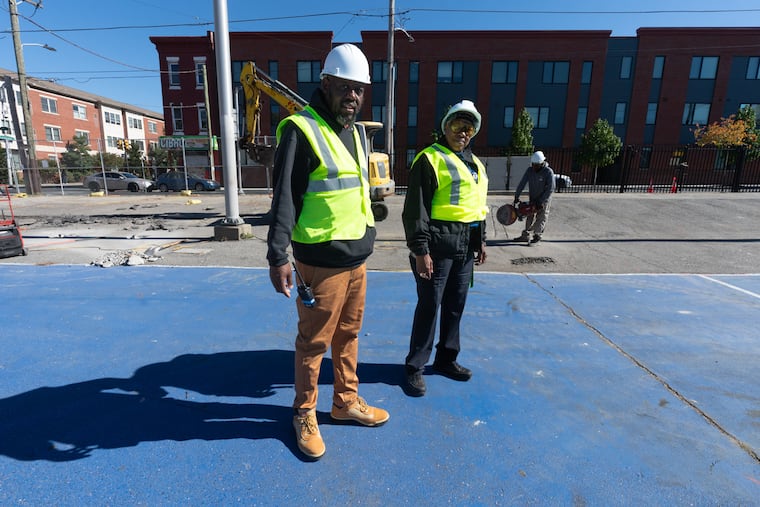New basketball courts are rising at the famous 16th and Susquehanna site in North Philly after yearslong wait
From a "culture of no" to public money to fund basketball courts, a playground and other recreation opportunities at a once-fabled site in North Philly.

For a time, 16th and Susquehanna was the center of the Philly playground basketball world: Hank Gathers played there in the 1980s with hundreds watching. Lionel Simmons, Doug Overton, and others starred there, too, before they headed to the NBA.
But the courts and the playground at adjoining Tanner G. Duckrey Elementary eventually fell into disrepair, an acre of cracked asphalt and concrete and broken equipment, more an eyesore than a point of pride.
Many North Philadelphia neighbors and students at Duckrey, a Philadelphia School District K-8, never stopped believing the space could be something more, something better — a hub, a gathering spot, even better than before, with opportunities for all.
“Kids wanted a place to play,” said Danita Bates, a longtime neighbor and former Duckrey parent whose relatives still attend the school, and who now works as a school security officer there.
About a decade ago, Duckrey students learned about peaceful civic protests and began strategizing a way to draw attention to their dream of bringing a new playground and new courts to the space. They held a sit-in at the principal’s office. They appealed to then-City Council President Darrell L. Clarke, who was moved to action and found money for part of the project.
In 2018, city and district officials opened a new playground to much fanfare. But that was just one piece, and funds ran out before the next phase could be completed. The nonprofit love.fútbol and a private foundation came through next with a multisport field at the site in 2019, but the basketball courts remained dilapidated and neglected.
‘Some people just walked away’
Bates and Brite Alexander, another longtime North Philadelphia resident involved in planning, have called a lot of politicians and foundations talking about the site’s past glory and its potential. But the project often seemed to be one step forward and two steps back — COVID-19 hurt; some state funding disappeared on a technicality. Contractors came and went, and the site license lapsed, said Lois Brink, chief strategy officer of the Big Sandbox, the nonprofit working with North Philadelphia neighbors to bring the project to life.
“Some people just walked away from the job,” said Bates.
“There’s been such a culture of ‘no’ in North Philadelphia — empty promises,” said Brink.
Bates and Alexander have been working on the project so long that they testified about it three times before two separate school governance boards — the old School Reform Commission and the current school board. (They most recently testified in August, asking the board why, if the court project had been green-lit in 2023, they were still waiting for a site license. District officials expedited the paperwork the next day.)
“I’m always knocking on the door, saying, ‘We need this,’” said Bates.
With $1.1 million in funds finally available from the federal and state government and the approvals in place, Brink had to hurry up and find a new contractor to start work on the project’s centerpiece — its basketball courts. She was worried, because the job wasn’t a big moneymaker for any firm.
“This is an equity project,” said Brink. “This is a project you do because the children deserve this.”
Enter George Buell, head of Buell Development Group LLC.
“I wanted to do this because of the cultural value,” said Buell, who was born in Thailand to a military family but whose family has roots in North Philadelphia and who moved back to the city in his youth. “I wanted to give back to the community, to show my appreciation for the environment that raised me.”
When Buell was a teenager, he’d take SEPTA from Southwest Philadelphia to 16th and Susquehanna to play in a game himself or watch the greats play.
“We’d come up here and get chased back to the subway,” Buell said, laughing. “The Philly summer league, it was everything.”
Patience pays off
Now, the site is a hive of activity, with Buell’s crew using jackhammers and excavators to tear up the old asphalt on a recent day. They’re several weeks into the project, which is expected to be completed this fall. (Buell jokes that he’s not sleeping much, but he vows it will be done on time because “it’s ours, our baby.”)
Watching construction on a recent day, Bates was incredulous.
“I’m ecstatic,” she said. “Neighbors played a major part — they were very supportive, very patient.”
“I’m thankful,” added Alexander. “We’re just trying to bring the community together.”
Brink credits Bates and Alexander for their perseverance.
“A lot of people said, ‘No, it’s never going to happen,’ but I had to be the go-getter guy,” said Alexander.
And now? Soon, full-size courts and an electronic scoreboard will rise on the site. Murals will be painted. Fitness equipment is ready to be installed; a walking track will also be created. Bates and Brink hope to secure funding to refurbish tennis courts on the site, and eventually secure a land-use agreement to allow nonprofits to run programs and maintain the property.
The goal is to keep the complex open for the community outside of school hours.
“This,” Bates said, “is going to be for everybody.”